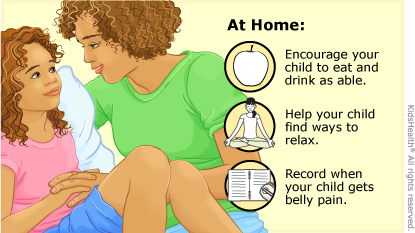Stomachache: How to Care for Your Child
A stomachache is when someone has pain in the belly. Stomachaches are common in kids and usually don't have a serious cause. Your child stayed in the hospital and now is ready to go home. At home, there are ways to prevent stomachaches and treat them if your child does have them.


To help prevent stomachaches:
-
Offer 4 or 5 small meals a day (instead of 3 large meals).
-
Don't offer foods and drinks that may bother the stomach. These include soda, caffeine, orange juice, milk, cheese, fried or greasy food, high-fat foods, and tomatoes.
-
Limit foods and drinks that cause gas, like beans, broccoli, hard candy, and carbonated drinks like soda.
If your child has a stomachache at home, they can:
-
Lie down quietly and rest.
-
Try to poop.
-
Avoid solid foods for a few hours. During this time, only give clear liquids like broth, watered-down fruit juice, or water. Then, if your child feels better, try small amounts of mild foods like rice, applesauce, and crackers.
-
Try a pain reliever (if your health care provider says it's OK) such as acetaminophen (Tylenol®, Panadol®, or a store brand) or ibuprofen (Advil®, Motrin®, or a store brand).
Keep a journal of your child's stomachaches. Include:
-
what your child is doing when the pain starts
-
how long the pain lasts
-
how severe the pain is (for example, on a scale of 1–5)
-
where in the belly the pain happens
-
what makes the pain go away
-
if your child could do regular activities
Other things to remember:
-
Give any medicines as prescribed by the health care provider.
-
Don't give your child laxatives, antacids, or other medicines unless recommended by the health care provider.
-
Talk to the health care provider before giving your child any supplements or herbs.
-
If the health care provider recommends it, have your child talk to a counselor. Sometimes stomachaches can be caused by stress or anxiety, and talking to a professional may help.
-
Go to all follow-up visits with the health care provider.

Your child:
-
has a stomachache that is getting worse
-
has pain that wakes them at night
-
has pain in the lower right side of the belly
-
has back pain
-
is constipated (having hard poops or not pooping regularly)
-
has severe diarrhea
-
has blood in the poop
-
won't eat or drink anything
-
loses weight
-
gets a rash
-
has a fever, feels sick to the stomach, has pain when peeing, or is throwing up
-
doesn't want to do regular activities such as school, family and friend get-togethers, and sports because of stomachaches

Your child:

What causes stomachaches? Many things can cause stomachaches, including:
Sometimes, it's not clear what's causing stomachaches.
Should my child go to school and other activities with a stomachache? If the stomachache is not too severe, encourage your child to do regular activities. Tell your child that you know that they have pain and are not faking, but you would like them to try the activity. Help your child make a plan for if a stomachache happens or doesn't go away during an activity. For example, if the stomachache happens at school, they can go to the nurse's office to lie down for 15 minutes.